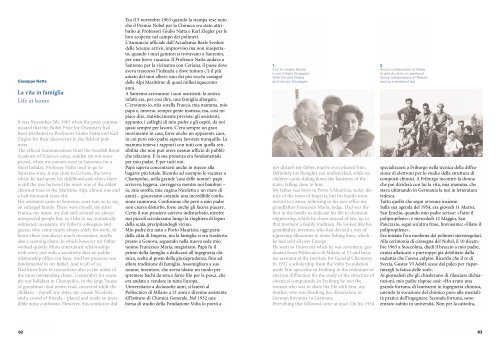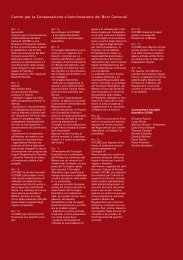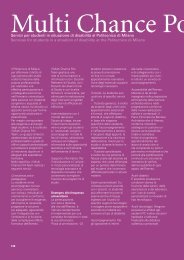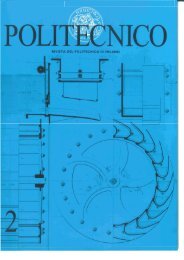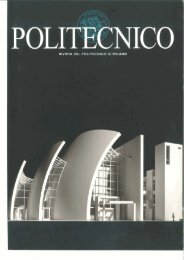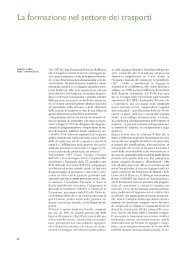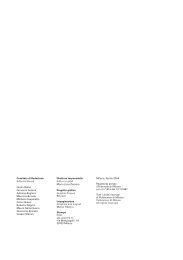Scarica il PDF (1959KB) - Rivista Politecnico - Politecnico di Milano
Scarica il PDF (1959KB) - Rivista Politecnico - Politecnico di Milano
Scarica il PDF (1959KB) - Rivista Politecnico - Politecnico di Milano
You also want an ePaper? Increase the reach of your titles
YUMPU automatically turns print PDFs into web optimized ePapers that Google loves.
Giuseppe Natta<br />
La vita in famiglia<br />
Life at home<br />
It was November 5th, 1963 when the press communicated<br />
that the Nobel Prize for Chemistry had<br />
been attributed to Professors Giulio Natta and Karl<br />
Ziegler for their <strong>di</strong>scoveries in the field of polymers.<br />
The official Announcement from the Swe<strong>di</strong>sh Royal<br />
Academy of Sciences came, sudden yet not unexpected,<br />
when my parents were in Sanremo, for a<br />
short holiday. Professor Natta used to go to<br />
Sanremo since it was close to Ceriana, the town<br />
where he had spent his ch<strong>il</strong>dhood and where there<br />
is st<strong>il</strong>l the tree he loved the most: one of the oldest<br />
chestnut trees in the Maritime Alps, almost one and<br />
a half thousand years old.<br />
His assistants came to Sanremo: ours was, so to say,<br />
an enlarged fam<strong>il</strong>y. There were myself, my sister<br />
Franca, my mum, my dad and, around us, always<br />
unexpected people but, so I like to say, statistically<br />
estimated: assistants, my father’s colleagues and<br />
guests, who came nearly always solely for work. At<br />
home there was always much movement, maybe<br />
also a seeming chaos, in which however my father<br />
worked quietly. Mum entertained relationships<br />
with every one with a sensitivity that no public<br />
relationship office can have. And her presence was<br />
fundamental to my father. And to all of us.<br />
Dad knew how to concentrate also in the midst of<br />
the most outstan<strong>di</strong>ng chaos. I remember for example<br />
our holidays in Champoluc, in the large ‘house<br />
of grandmas’: dad wrote, read, corrected wh<strong>il</strong>e the<br />
ch<strong>il</strong>dren – myself, my sister, my cousin Nicoletta<br />
and a crowd of friends – played and made an incre<strong>di</strong>ble<br />
noisy confusion. However, this confusion <strong>di</strong>d<br />
82<br />
Era <strong>il</strong> 5 novembre 1963 quando la stampa rese noto<br />
che <strong>il</strong> Premio Nobel per la Chimica era stato attribuito<br />
ai Professori Giulio Natta e Karl Ziegler per le<br />
loro scoperte nel campo dei polimeri.<br />
L’Annuncio ufficiale dall’Accademia Reale Svedese<br />
delle Scienze arrivò, improvviso ma non inaspettato,<br />
quando i miei genitori si trovavano a Sanremo,<br />
per una breve vacanza. Il Professor Natta andava a<br />
Sanremo per la vicinanza con Ceriana, <strong>il</strong> paese dove<br />
aveva trascorso l’infanzia e dove tuttora c’è <strong>il</strong> più<br />
amato dei suoi alberi: uno dei più vecchi castagni<br />
delle Alpi Marittime <strong>di</strong> quasi m<strong>il</strong>lecinquecento<br />
anni.<br />
A Sanremo arrivarono i suoi assistenti: la nostra<br />
infatti era, per così <strong>di</strong>re, una famiglia allargata.<br />
C’eravamo io, mia sorella Franca, mia mamma, mio<br />
papà e, intorno, sempre gente inattesa, ma, così mi<br />
piace <strong>di</strong>re, statisticamente prevista: gli assistenti,<br />
appunto, i colleghi <strong>di</strong> mio padre e gli ospiti, da noi<br />
quasi sempre per lavoro. C’era sempre un gran<br />
movimento in casa, forse anche un apparente caos,<br />
in cui però mio padre sapeva lavorare tranqu<strong>il</strong>lo. La<br />
mamma teneva i rapporti con tutti con quella sensib<strong>il</strong>ità<br />
che non può avere nessun ufficio <strong>di</strong> pubbliche<br />
relazioni. E la sua presenza era fondamentale<br />
per mio padre. E per tutti noi.<br />
Papà sapeva concentrarsi anche in mezzo alla<br />
bagarre più totale. Ricordo ad esempio le vacanze a<br />
Champoluc, nella grande ‘casa delle nonne’: papà<br />
scriveva, leggeva, correggeva mentre noi bambini –<br />
io, mia sorella, mia cugina Nicoletta e un mare <strong>di</strong><br />
amici – giocavamo creando una incre<strong>di</strong>b<strong>il</strong>e confusione<br />
rumorosa. Confusione che però a mio padre<br />
non creava <strong>di</strong>sturbo, forse anche gli faceva piacere.<br />
Certo <strong>il</strong> suo pensiero correva in<strong>di</strong>sturbato, mentre<br />
noi piccoli scivolavamo lungo la ringhiera <strong>di</strong> legno<br />
della scala, precipitandogli vicino.<br />
Mio padre era nato a Porto Maurizio, oggi parte<br />
della città <strong>di</strong> Imperia, ma la famiglia si era trasferita<br />
presto a Genova, seguendo nella nuova sede mio<br />
nonno Francesco Maria, magistrato. Papà fu <strong>il</strong><br />
primo della famiglia a de<strong>di</strong>carsi all’ingegneria chimica,<br />
scelta al posto della giurisprudenza, fino ad<br />
allora tra<strong>di</strong>zione <strong>di</strong> famiglia. Assomigliava a suo<br />
nonno, inventore, che aveva ideato un modo per<br />
spremere bachi da seta e farne f<strong>il</strong>o per la pesca, che<br />
era andato a vendere in tutta Europa.<br />
Universitario a <strong>di</strong>ciassette anni, si laureò al<br />
<strong>Politecnico</strong> <strong>di</strong> M<strong>il</strong>ano a 21 anni e <strong>di</strong>venne assistente<br />
all’Istituto <strong>di</strong> Chimica Generale. Nel 1932 una<br />
borsa <strong>di</strong> stu<strong>di</strong>o della Fondazione Volta lo portò a<br />
1.<br />
Con la moglie Rosita<br />
e con <strong>il</strong> figlio Giuseppe<br />
With his wife Rosita<br />
and his son Giuseppe<br />
not <strong>di</strong>sturb my father, maybe even pleased him.<br />
Definitely his thoughts ran un<strong>di</strong>sturbed, wh<strong>il</strong>e we<br />
ch<strong>il</strong>dren came sli<strong>di</strong>ng down the banisters of the<br />
stairs, falling close to him.<br />
My father was born in Porto S.Maurizio, today <strong>di</strong>strict<br />
of the town of Imperia, but his fam<strong>il</strong>y soon<br />
moved to Genoa, following in his new office my<br />
grandfather Francesco Maria, judge. Dad was the<br />
first in the fam<strong>il</strong>y to de<strong>di</strong>cate his life to chemical<br />
engineering, which he chose instead of law, up to<br />
that moment a fam<strong>il</strong>y tra<strong>di</strong>tion. He looked like his<br />
grandfather, inventor, who had devised a way of<br />
squeezing s<strong>il</strong>kworms to make fishing lines, which<br />
he had sold all over Europe.<br />
He went to University when he was seventeen, graduated<br />
from <strong>Politecnico</strong> <strong>di</strong> M<strong>il</strong>ano at 21 and became<br />
assistant at the Institute for General Chemistry.<br />
In 1932 a scholarship from the Volta Foundation<br />
made him specialise in Freiburg in the technique of<br />
electron <strong>di</strong>ffraction for the study of the structure of<br />
chemical compounds. In Freiburg he met the<br />
woman who was to share her life with him, my<br />
mother, who was finishing her <strong>di</strong>ssertation in<br />
German literature in Germany.<br />
Everything that followed came at once. On his 1954<br />
2.<br />
Alcuni collaboratori <strong>di</strong> Natta<br />
in gita durante un weekend<br />
Some collaborators of Natta’s<br />
during a weekend trip<br />
specializzarsi a Friburgo nella tecnica della <strong>di</strong>ffrazione<br />
<strong>di</strong> elettroni per lo stu<strong>di</strong>o della struttura <strong>di</strong><br />
composti chimici. A Friburgo incontrò la donna<br />
che poi <strong>di</strong>viderà con lui la vita, mia mamma, che<br />
stava ultimando in Germania la tesi in letteratura<br />
tedesca.<br />
Tutto quello che seguì avvenne insieme.<br />
Sulla sua agenda del 1954, era giovedì 11 Marzo,<br />
San Eraclio, quando mio padre scrisse: «Fatto <strong>il</strong><br />
poliprop<strong>il</strong>ene»; e mercoledì 12 Maggio, San<br />
Pancrazio, seguì un’altra frase, brevissima: «F<strong>il</strong>ato <strong>il</strong><br />
poliprop<strong>il</strong>ene».<br />
Era iniziata l’era moderna dei polimeri stereoregolari.<br />
Alla cerimonia <strong>di</strong> consegna del Nobel, <strong>il</strong> 10 <strong>di</strong>cembre<br />
1963 a Stoccolma, <strong>di</strong>e<strong>di</strong> <strong>il</strong> braccio a mio padre,<br />
ormai affaticato e purtroppo già deb<strong>il</strong>itato dalla<br />
malattia che l’aveva colpito. Ricordo che <strong>il</strong> re <strong>di</strong><br />
Svezia, Gustav VI Adolf, scese dal palco per risparmiargli<br />
la fatica delle scale.<br />
Ai giornalisti che gli chiedevano <strong>di</strong> r<strong>il</strong>asciare <strong>di</strong>chiarazioni,<br />
mio padre rispose così: «Ho avuto una<br />
grande fortuna, <strong>di</strong> laurearmi in ingegneria chimica,<br />
unendo la vocazione del chimico puro alla mentalità<br />
pratica dell'ingegnere. Seconda fortuna, sono<br />
entrato subito in università. Non per la cattedra,<br />
83


